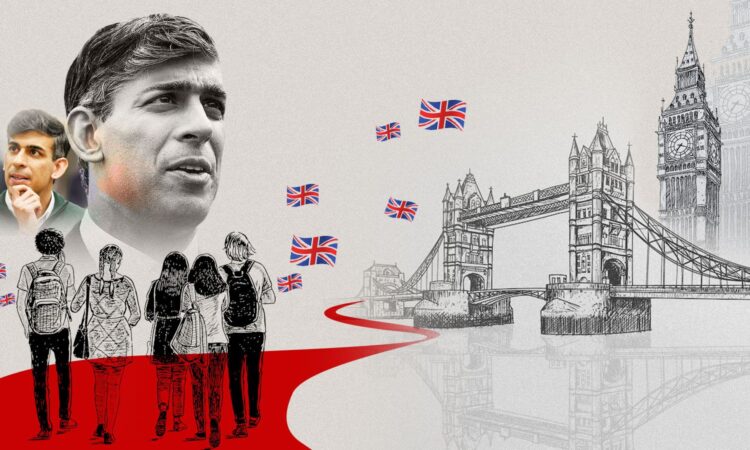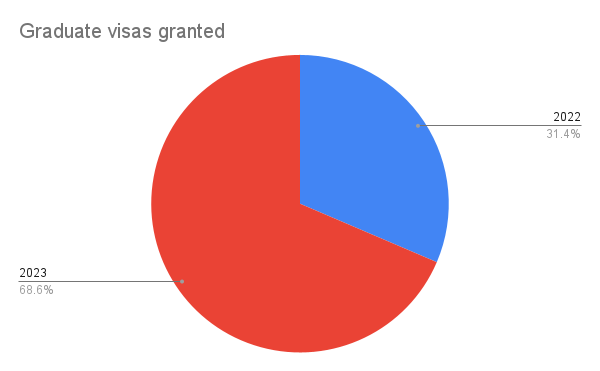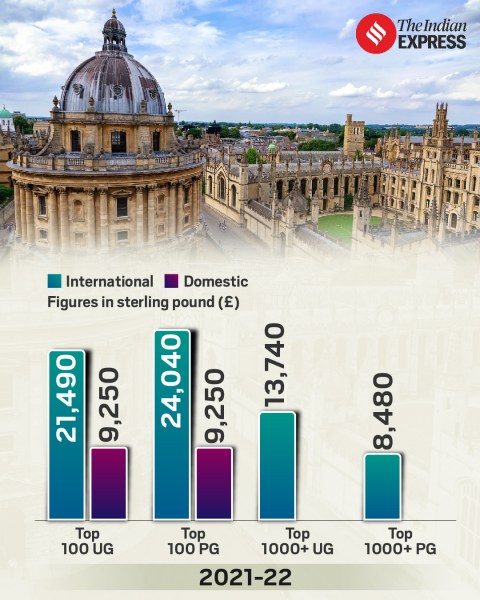UK Graduate visa: How will it impact Indian students and how much we contribute to UK’s economy? | Education News

The UK government led by PM Rishi Sunak will retain the graduate visa route, which permits international students to work or look for a job for two years after graduation.
The recently released Migration Advisory Committee (MAC) report too has recommended that the UK’s graduate visa route “remains in place in its current form.”
Why the change of heart? Experts claim that if Sunak cancels the graduate route visa, universities across the UK will experience substantial financial difficulty leading to job losses, course closures and a reduction in research, and in the extreme it is not inconceivable that some institutions would even shut down.
“Majority of the UK universities’ financial stability depends heavily on the tuition fee paid by the international students (mainly postgraduate/ masters students), and without that the universities can collapse,” said Lord Karan Bilimoria, the chancellor of the University of Birmingham told indianexpress.com.
Universities lose money on teaching domestic students and on research activities. The fee from international students mitigates (at least in part) the current funding gap for domestic students and research. “We have not received any indication in our discussion with ministers, either in Westminster or the Devolved Administrations, that there is any plan in place to address this structural under-funding. In such circumstances, any policy change to the Graduate route intended to reduce student numbers would need to explain how the financial consequences for the sector would be addressed,” the report further stated.
What the numbers tell
The MAC 2024 report also suggests that growth in the total number of visas has been faster for postgraduate study.
As per the data provided, in the first full year of the Graduate route (year to Q2 2022), there were 66,000 Graduate visas granted for main applicants and dependants. This doubled to 144,000 visas in 2023.

Of the 114,000 main applicant visa holders in 2023, 99% held a 2-year visa as they had completed an undergraduate or Master’s degree (or equivalent), whilst 1% (1,500 visas) held a 3-year visa having completed a PhD/other doctoral qualification or equivalent. There were 30,000 dependent visas issued in 2023.

- 2-year visas: Representing 99% of the main applicant visas, which amounts to 112,860 visas.
- 3-year visas: Representing 1% of the main applicant visas, which amounts to 1,140 visas.
- Dependent visas: Representing 30,000 visas.
Of these graduate visa holders, Indian nationals made up a higher proportion of Graduate visas (42%) compared to their proportion of student visas (26%).
Statistics show that the higher education sector directly employed 513,600 workers in the UK in 2022, spread relatively evenly across the country. The areas where the higher education sector supported 10,000+ jobs were the surrounding major universities. The top three areas are — Oxfordshire, Camden and City of London, and the City of Edinburgh.
Moreover, the total UK revenue from education-related exports and transnational education (TNE) activity was estimated to be £27.90 billion in 2021, having risen 7% since 2019 based on current prices, indicating that the 2030 target will be met. International students are a key component of this export success, the MAC report and the September 2018 MAC Report on ‘Impact of international students in the UK’ shows.
International fees are a large component of the UK’s HE institutions’ total fees, accounting for 45% of total fees across the sector. There is a clear pattern across universities of a higher share of fees being paid by international students at higher-ranked universities: 69% of total fees for the top 100 ranked universities, and 31% for those ranked 1000+.
To further explain the point, take a look at this data: In the academic year 2021-22, international students studying at UK universities in the top 100 ranked universities paid £21,490 and £24,040 in average annual fees for undergraduate and postgraduate (taught) study respectively, compared to the £9,250 maximum for domestic undergraduate fees. For universities ranked 1000+ average fees paid were lower, at £13,740 for undergraduate study and £8,480 for postgraduate (taught) study.

Meanwhile, domestic undergraduate fees for UK students in England have been frozen at £9,250 since 2017 and will continue for the 2024-25 academic year.
Further, international fees are just one part of total income. The total income is made up of many streams including teaching and research grants, donations, and investment income. International fees account for 22% of total income for those ranked in the top 100 and slightly higher at 23% of total income for the 1000+.
How do international students’ affect a university’s profit/loss?
— Universities make on average 31p for every pound spent on teaching international students, whilst domestic teaching makes an 8p loss for every pound spent.
— In line with higher average fees, universities with high research income made 78p for every pound spent on international teaching. These research-intensive universities use a substantial portion of the surplus made on international teaching to subsidise research, which accounts for a significant proportion of their activities, and on which they lose 27p for every pound spent.
Even Russell Group has stated that a 10% reduction in international student numbers would reduce their universities’ collective income by over £500m a year. “Income from international students has enabled our universities to grow the number of places for UK undergraduates over time despite the shortfalls in government funding: between 2019/20 and 2021/22, the number of UK students at our universities grew by 10%, while international student numbers grew by 11%,” Dr Tim Bradshaw, CEO of the Russell Group, said in an official release.
Interestingly, this concept is also understood by the general public of the UK. Survation recently conducted a poll for the Russell Group, where they asked 1,064 locals about their views on higher education and international students. Over half (51%) were concerned that cutting international student numbers would lead to an increase in tuition fees for UK students, and 58% believed that universities should be able to use international student fees to support the sector – with just 7% disagreeing.
Instead, 57% think tackling illegal immigration should be the UK government’s immigration priority.
Alternate measures
On controlling immigration in the country, Lord Bilimoria, the first Indian-born Chancellor of a Russell Group university, suggests that the UK government needs to “remove international students from the net migration figures.”
“Adding international students to the net migration figures has a damaging effect and inflates the figures unnecessarily. Other countries such as the United States of America and Australia exclude international students from the net migration because then they treat them as temporary migrants — which is what they are considering that some of them leave after studying for 1, 2 or 3 years of programmes,” he explains.
The same is proved in the recent MAC report too.

The report quotes the QS International Student Survey, which draws responses from 110,000 prospective international students. As per this data, 53% of prospective international students expect to remain in their chosen country after their studies, though only 13% expect to stay permanently.
If not UK, then what?
Even though the UK government has been having an internal and external conflict regarding international students, it remains a popular choice for Indian students. Quality of education and trust that the UK offers a high standard of education are usually seen as the main reasons. Some experts, too, believe that students should keep the UK as one of their top options.
“We believe those with admission offers for September intake must not waste time and act before it’s too late. They must proceed to make deposits, secure accommodations, and plan their travel ahead of their landing in the UK in September,” Saurabh Arora, CEO & founder, University Living advised students.
However, in the UK’s Home Office survey, among the surveyed international students who considered other countries, the most commonly were the United States (US) (51%), Canada (42%) and Australia (34%).
Alongside the US, multiple European countries such as Ireland, Germany, France, and Italy are also emerging as attractive options for international students due to their student-friendly and welcoming visa policies, study abroad experts suggest.







